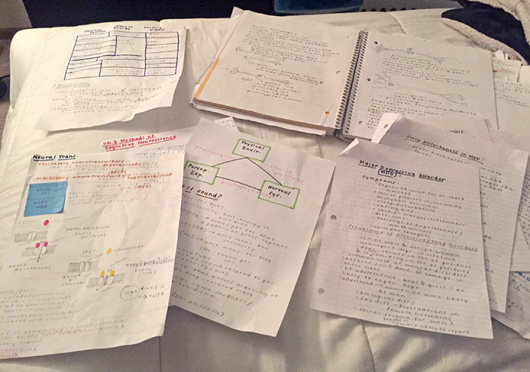
In a study published last year conducted by researchers at Princeton University and the University of California, Los Angeles, handwritten notes were found to be more effective in helping students retaining information. Credit: Courtesy of Katie Storme
Closing your computer could jump start your grades this semester.
Computers can be distracting, but using a computer in class can affect students’ study habits as much as it affects their attention spans, according to a recent study.
Helena Rempala, an Ohio State clinical psychologist, said there can be retention benefits to using a pen and paper to take notes.
“There is more comprehension when you physically write,” Rempala said. “(When we write) we think slower. We comprehend twice. Once when listening, and then again when writing.”
In a study published last year conducted by researchers at Princeton University and the University of California, Los Angeles, handwritten notes were found to be more effective in helping students retain information.
The study, which tested 67 Princeton students and 151 UCLA students on their retention of information presented in a 15-minute TED talk, showed that students who wrote their notes by hand comprehended information better than those who typed them on a laptop.
Approximately half of the students tested were asked to take notes on the lecture by hand, and the other half were asked to take notes using a computer.
The study found that students who typed their notes had more content written down in a cleanly organized manner, but the notes were verbatim from the lecture. On the other hand, students who used longhand had fewer words, but they used keywords that demanded comprehension of topics to recall.
“The studies … here show that laptop use can negatively affect performance on educational assessments, even — or perhaps especially — when the computer is used for its intended function of easier note taking,” the study states. “Although more notes are beneficial, at least to a point, if the notes are taken indiscriminately or by mindlessly transcribing content, as is more likely the case on a laptop than when notes are taken longhand, the benefit disappears.”
Rempala said verbatim writing diminishes comprehension and copious notes might not be what students need. She also said she thinks students prefer typing because they can get more words down on the page, so it seems as though they have more information to study.
Some OSU professors, like Margaret Rooney, a professor in the School of Communication, have taken steps to reduce the presence of technology in their classes.
Rooney said she started this policy four semesters ago because she was worried about technology’s negative impact on the classroom setting.
Rooney has taught many courses at OSU, but has most recently imposed her computer ban in her Research Methods course.
Although she acknowledged the research behind the benefits of taking notes with pen and paper, Rooney said she was more worried about computers distracting students from the course environment.
“Students actually seem to like the class more,” she said. “Once on a course evaluation in Public Speaking, I had a student write, ‘I normally don’t show up to classes, but this one was fun.’”
Rooney said she wants her students to focus in class, but thinks the no-computer atmosphere encourages students to contribute more to in-class discussions.
“Instead of focusing on their computer before class, they’ll talk to each other,” she said.
Some students have also decided to use pen and paper during class instead of computers.
“I tried to take all my notes on my computer when I came to college, but it didn’t work out,” said Katie Storme, a third-year in psychology.
Storme said she stopped taking notes on the computer after her first semester because she realized her studying was suffering, but it took until after her final exams for her to change her notetaking style.
“Having a computer was distracting. It was so easy to get lost,” she said. “But the big thing was that typing the notes wasn’t as engaging.”
Now, Storme said she uses a hybrid system including both longhand and typing. Although her pages are color-coded with drawings and boxes and diagrams, her notes sprawl out in organized madness.
But using a personal touch is only one added benefit of writing out notes, Storme said.
“I’ll handwrite most notes especially when I’m diagramming systems for a psychology class,” she said. “But when doing things like vocab, I’ll still use my computer. I don’t notice a difference.”
Rempala had an explanation for this, too. Although typing notes might decrease comprehension of concepts, factual retention is still high when using a laptop, she said.
Conceptual information, such a question that asks about the differences between the two major political parties, is better retained when written out by hand, but there is no difference when it comes to factual information, like years, dates and names, Rempala said.
For students who have not yet determined what works best for them, Rempala said she would first suggest trying to take notes without the computer.
“If you do have problems studying, try not to type your notes,” she said. “Use notebooks, pens — colorful pens — use underlining.”
Rempala added that, despite what the study said, a successful notetaking system is ultimately determined by individual preference.
“Use a healthy balance,” she said. “Every person is different and needs their own style.”


